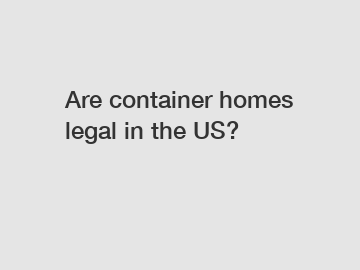Are container homes legal in the US?
Are container homes legal in the US?
Are container homes legal in the US? This is a question that has gained traction in recent years as more and more people consider alternative housing options. Shipping container homes, made by converting large storage containers into livable spaces, offer an affordable and eco-friendly approach to home construction. However, their legal status varies across different states and local jurisdictions. Let's explore the legality of container homes in the US and the factors that affect their acceptance.
1. Zoning Regulations:

Zoning regulations dictate how land in specific areas can be used. They typically specify the types of structures allowed within particular zones. Many places have restrictions on unconventional housing options like shipping container homes. In some areas, container homes are treated as accessory dwellings or mobile homes, subject to certain limitations. Understanding your local zoning regulations is crucial before embarking on container home construction.
2. Building Codes:
Building codes are regulations that set standards for construction and ensure the safety of occupants. These codes vary across states and cities, and some may not specifically address container homes. However, containers can comply with building codes if certain modifications are made, such as adding insulation, ventilation systems, and meeting structural requirements. Seeking guidance from local building officials or consulting with architects and engineers experienced with container homes can help navigate these codes.
3. Permits and Inspections:
Obtaining permits and undergoing inspections are essential steps in any construction project. The process for container home permits differs among jurisdictions. Some may require additional documentation, engineering certifications, or architectural plans to ensure compliance with the building codes. Hiring professionals familiar with container home construction can streamline this process and ensure all necessary permits are acquired.
4. Local Acceptance:
While zoning regulations and building codes play a significant role in determining the legality of container homes, local acceptance is equally important. Public opinion and community response can influence how container homes are perceived by local authorities. Some areas are more open to alternative housing solutions, while others may be skeptical or resistant. Engaging in dialogue and educating the community about the benefits of container homes can help foster acceptance.
Container homes have gained attention for their sustainability, affordability, and versatility. Many proponents argue that they offer a solution to housing shortages, repurpose unused shipping containers, and reduce construction waste. Despite the legal considerations, container homes have proven to be successful in various locations across the US, with advocates pushing for more widespread acceptance.
In conclusion, the legality of container homes in the US is a complex issue influenced by zoning regulations, building codes, permits, inspections, and local acceptance. While container homes may face legal challenges in some areas, they have found success in others, promoting a more sustainable and innovative approach to housing. If you are considering building a container home, it is crucial to thoroughly research and understand the regulations and requirements specific to your location. Additionally, consulting professionals who have experience with this type of construction can help ensure a smooth and legal process.
The company is the world’s best Container Granny Flat for Sale, 2 20ft container home, 40ft Expandable Container House supplier. We are your one-stop shop for all needs. Our staff are highly-specialized and will help you find the product you need.
117
0
0


Comments
All Comments (0)